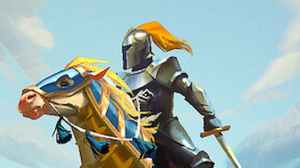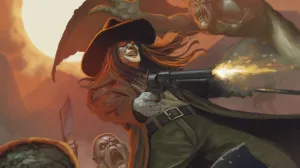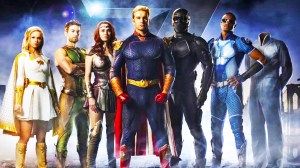There are many stand-out moments in the Doctor Strange in the Multiverse of Madness trailers, but even among a wealth of captivating scenes, one, in particular, perhaps resonates more. It’s the moment when Scarlet Witch (Elizabeth Olsen) looks at Doctor Strange (Benedict Cumberbatch) and says, “You break the rules, you become the hero. I do it and I become the enemy. It doesn’t seem fair.”
Videos by ComicBook.com
For Wanda Maximoff, it’s a moment of vulnerability, but also one in which she serves as the voice of the observer. Indeed, what she’s saying is true. Doctor Strange’s reckless use of magic — a breaking of the “rules” — hasn’t seemed to tarnish how he’s perceived among his peers, but Wanda has been fighting an uphill battle regarding opinions about her moral compass for years.
Long before the incidents in Westview, her mistakes or lack of training were held against her in ways Doctor Strange’s simply aren’t. She is, very simply, painted as the villain — and incorrectly so. While Scarlet Witch has made mistakes, caused plenty of damage, and even showed disregard for consequences, Wanda’s actions, to date, do not make her villain. Instead, she’s a flawed person (albeit one with immense power) who must now do the best she can with the limited guidance and support that’s been available to her.
When it comes to looking at why Scarlet Witch isn’t a villain, there are several things that we should consider — the actual definition of what a villain is, Wanda’s intent when it comes to her more notorious actions, her history of trauma, the possibility of gender-based double standard or bias, and even the possibility that there are larger forces at play for some of her particularly egregious acts. This is where we dip our toes a bit into theory and speculation. By looking at those things, we won’t necessarily absolve Wanda of her actions, but we will see her in a perhaps more accurate light — not as a villain, but as a character that is somewhere in between.
A villain is typically defined as “malicious,” a “scoundrel”, and an “agent of evil.” Wanda doesn’t fit any of those definitions. She is not cruelly malicious, nor is she devoted to wickedness or crime. She’s not part of an “evil agency” in terms of plot, and I’d hardly describe her as a scoundrel. I will concede that Wanda has participated in criminal acts, but technically so has the entirety of the Avengers roster — and even at that, Wanda’s acts were never deliberately malicious. Even what she did in Westview, while selfish, was not meant to cause harm to others. It was meant to alleviate her own suffering.
This thought raises an important point: intent. When it comes to true villainy, intent matters. Wanda’s actions in Westview were not a matter of “I’m setting out to hurt other people because it benefits me”. One could probably argue that Wanda was so blinded by her own suffering that she was trying to assuage, she wasn’t fully aware of just how much she was hurting those caught in her hex, something we do get a sense of at the end of the series when she releases everyone. Taking things back further, what happened in Lagos in Captain America: Civil War should also not be seen as an act of villainy. Wanda’s efforts there were intended to save lives, not cost them — and while that did go horribly awry, she did try to do a good thing. That was her intent. We’ve even seen Wanda change the intent of her actions and alliances when she realizes what’s at stake, which was the case in Avengers: Age of Ultron when she realized that Ultron’s purpose was to inflict mass destruction.
Outside of intent, it’s important to consider Wanda’s experiences when evaluating her actions. Wanda comes from a very traumatic background. Her home country was ravaged by war, courtesy of the United States and specifically Stark Industries weaponry, and her parents died quite literally in front of her when their home was bombed as a child. This experience would impact anyone, even more so a child. Adverse childhood experiences, or ACEs, have a tremendous impact on a person’s future in nearly many ways, from both physical and mental health to the likelihood of future victimization and traumatization. While it’s impossible to know exactly what life experiences Wanda endured after her parents’ death, it’s possible that due to being orphaned at a young age and also ending up with HYDRA, Wanda’s ACEs include physical and emotional abuse, neglect, and household dysfunction which would give her an approximate test score around a 5 — a score that has a serious impact on future behavior and health. None of that is to say that Wanda’s trauma is an excuse for her behavior, but it’s certainly a factor. It explains why her rational thinking skills may differ from others, why her response to loss may be more extreme than someone else’s, and why she may not have the best grasp of her own powers — which, in turn, provides more nuance to her actions than just villainy.
We must also consider Wanda’s own words with regard to her own actions. In fact, there is a bit of a double standard when it comes to perception of selfish or reckless behavior and the gender of the person carrying said behavior out. Doctor Strange and his decision to cast a spell in Spider-Man: No Way Home that he knew from the outset was dangerous and could go horribly awry was certainly, at a minimum, a bending of the rules, but that’s also not the only example. Both Tony Stark and Steve Rogers have made some selfish choices that were overlooked simply because of who they are. Tony created a mess when he insisted on the reverse-Snap being carried out in a way that would bring everyone back but not interfere with his own happiness. But hey, he’s a hero. Steve Rogers theoretically violated the rules of time travel and the use of the Time Stone by deciding to just stay in the past with Peggy Carter and while the world probably didn’t break from that, it was still a gamble, and no one’s calling him out for it. Both Steve and Tony specifically acted to either avoid pain or ease pain for themselves and neither of them had much thought about the impact on others. They aren’t dissimilar to Wanda, but we’re not calling them villains. There’s a real difference in how all of these characters are perceived by the fans and in their own canon, and it’s not hard to see why Wanda is singled out: she’s not a man.
While all these previous points merit consideration, there could also be an actual story-based reason why Wanda isn’t a villain. A fan theory that has quietly gained a bit of traction in the lead-up to Doctor Strange in the Multiverse of Madness is that Wanda wasn’t entirely in control of her actions in Westview. Some have suggested that Wanda may have already been under the influence of the Darkhold, prompting the hex in the first place. With Wanda already grieving the loss of Vision — the only person in the world who cared about her — she would be extremely vulnerable to that kind of manipulation. There’s already been a lot of speculation that there’s some larger, darker force at play (all those Mephisto theories, anyone?) so it’s not too much of a jump to consider the possibility that someone or something simply took advantage. That would make Wanda not a villain, but a victim herself.
Be it by definition, intention, experience, misogyny, or even manipulation, the Wanda Maximoff/Scarlet Witch that we know from the primary reality of the MCU simply doesn’t measure up as a villain. She’s certainly done things with terrible outcomes — and to be clear, no one is saying that her actions should be without consequence — but to claim that she is a villain is a stretch. Instead, Wanda is a character who is very much still on a journey of growth, one where she’s working to not only define who she really is, but also to become that best self. She’s flawed, but ultimately leans towards doing what’s right as she grows not only into her power, but into her place in the multiverse.
Doctor Strange in the Multiverse of Madness will arrive in theaters on May 6th.
Want to learn more about Doctor Strange and Scarlet Witch’s latest adventure in the Marvel Cinematic Universe? Check back on ComicBook CRAM every day leading up to the premiere of Doctor Strange in the Multiverse of Madness, and click here for even more content to find out everything you need to know about the new movie!








